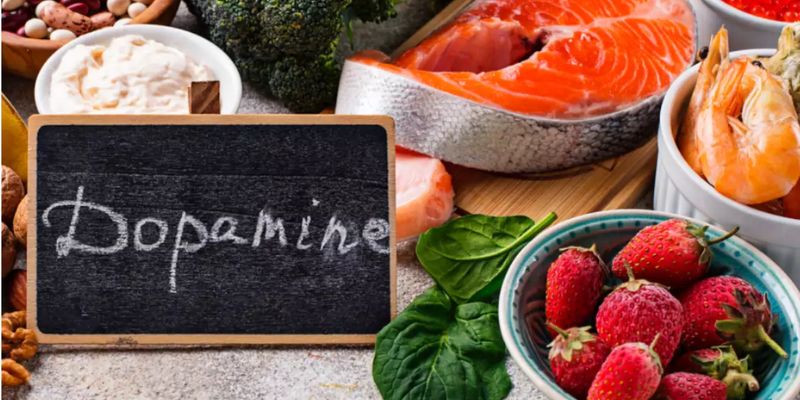Dopamine Diet: This Is What You Should Eat To Beat Stress and Feel Happy Instantly
Jul 01, 2023 By Nancy Miller
Are you feeling constantly stressed out and burned out in life? Do you forget to take time for yourself and indulge in some self-care? Don't worry; we have the perfect solution that may be just what you need to beat stress and find happiness.
Get ready to learn about the dopamine diet – a unique approach to eating designed specifically to help improve your mood, lower anxiety, and increase focus and energy while putting a smile on your face!
It entails incorporating certain foods into your daily routine based on their ability to elevate feelings of pleasure, reward, and motivation; it's an art that involves mastering healthy recipes made with ingredients known for stimulating dopamine production in your brain.
Keep reading this blog post, where we'll tell you everything there is to know about this helpful lifestyle so that by the end, you can benefit from being equipped with knowledge essential for carving out a healthier version of yourself.
What Is Dopamine

Dopamine is a neurotransmitter, a chemical messenger that enables nerve cells (neurons) in the brain communicate with one another. It has a significant impact on a variety of physiological processes, behaviours, and brain functions.
Dopamine is often associated with pleasure, motivation, and reward, but its functions extend beyond these. It regulates movement, mood, attention, learning, and the brain's reward system. Dopamine is produced in several brain areas, including the substantia nigra and the ventral tegmental area.
What Causes Dopamine Deficiency
Dopamine deficiency can be caused by several factors, including:
- Neurodegenerative disorders: Certain neurodegenerative disorders, such as Parkinson's, involve the progressive loss of dopamine-producing neurons in specific brain regions. This leads to a significant decrease in dopamine levels and can result in movement impairments and other symptoms.
- Genetic factors: Some individuals may have genetic variations that affect the production, release, or reuptake of dopamine, leading to lower neurotransmitter levels. These genetic factors can contribute to an increased susceptibility to dopamine deficiency.
- Medications and drug use: Certain medications can interfere with dopamine production or utilization in the brain, leading to decreased dopamine levels. Additionally, chronic drug use, particularly substances like cocaine and amphetamines, can disrupt the normal functioning of the dopamine system and deplete dopamine stores over time.
- Stress and chronic illness: Prolonged stress or chronic illnesses can affect dopamine levels. Stress hormones released during prolonged stress can interfere with dopamine production and utilization. Chronic illnesses impacting the brain, such as autoimmune disorders or tumors, can also disrupt dopamine pathways.
- Age-related decline: As individuals age, there can be a natural decline in dopamine production and receptor function. This age-related decline in dopamine levels may contribute to certain age-related conditions, such as decreased motivation and movement difficulties.
What Are The Symptoms of Dopamine Deficiency
- Movement difficulties, such as rigidity, tremors, or slowed movements.
- Loss of coordination and balance.
- Muscle stiffness or rigidity.
- Resting tremors (tremors that occur when muscles are at rest).
- Decreased motivation and apathy.
- Fatigue and lack of energy.
- Mood swings and depressive symptoms.
- Difficulty concentrating and impaired cognitive function.
- Decreased ability to experience pleasure or enjoyment.
- Sleep disturbances, such as insomnia or excessive daytime sleepiness.
- Impaired memory and difficulty with learning tasks.
- Social withdrawal and reduced interest in social activities.
How Is Dopamine Deficiency Diagnosed and Treated
Dopamine deficiency is typically diagnosed through a combination of medical history, physical examination, and assessment of symptoms. However, no specific diagnostic test is available to directly measure dopamine levels in the brain.
Treatment for dopamine deficiency depends on the underlying cause and the specific symptoms. However, the most effective is the Dopamine diet.
What Is the Dopamine Diet
The Dopamine Diet is based on the theory that certain foods can help boost dopamine production or increase the availability of its precursors in the brain. By consuming these foods, proponents of the diet claim that it may enhance mood, increase motivation, and improve overall well-being.
What Are Dopamine Boosting Foods

Protein-rich foods
Dopamine is synthesized from the amino acid tyrosine, so consuming protein sources like poultry, fish, eggs, dairy products, and legumes can build dopamine production.
Tyrosine-rich foods
Foods high in tyrosine, such as almonds, avocados, bananas, soy products, and pumpkin seeds, are believed to support dopamine synthesis.
Fruits and vegetables
Antioxidant-rich fruits and vegetables, including blueberries, strawberries, spinach, kale, and broccoli, may help protect dopamine-producing neurons from oxidative stress.
Dark chocolate
Dark chocolate contains flavonoids and other compounds that may positively affect mood and dopamine release. However, moderation is important due to its calorie and sugar content.
Green tea
Green tea contains an amino acid called L-theanine, which may increase dopamine levels and promote relaxation and focus.
Probiotic-rich foods
Emerging research suggests that a healthy gut microbiome may influence dopamine production. Probiotic-rich foods like yogurt, kefir, sauerkraut, and kimchi can support diverse and balanced gut microbiota.
Benefits of the Dopamine Diet
- Mood enhancement: Dopamine is often called the "feel-good" neurotransmitter because it is associated with feelings of pleasure, motivation, and reward. By incorporating dopamine-boosting foods into your diet, you may experience an uplift in mood and overall well-being.
- Stress reduction: Chronic stress can deplete dopamine levels in the brain, leading to fatigue, low motivation, and a negative impact on mental health. The Dopamine Diet focuses on nourishing the brain with foods that support dopamine production, potentially helping to combat stress and promote a more balanced emotional state.
- Increased motivation and focus: Dopamine is closely linked to motivation, drive, and cognitive function. By providing the necessary nutrients for dopamine synthesis, the Dopamine Diet may help enhance motivation, focus, and productivity, making it beneficial for tasks that require concentration or mental clarity.
- Improved energy levels: Dopamine plays a role in regulating energy and wakefulness. Following a diet that supports dopamine production, such as one rich in protein and tyrosine, may help optimize energy levels and combat fatigue.
- Balanced appetite and food cravings: Dopamine regulates food rewards and cravings. By maintaining optimal dopamine levels, the Dopamine Diet may help reduce food cravings, particularly for sugary or highly processed foods, and promote a more balanced and controlled approach to eating.
- Brain health support: The Dopamine Diet emphasizes nutrient-dense foods, including fruits, vegetables, and sources of omega-3 fatty acids, which are important for overall brain health. These foods provide antioxidants, vitamins, and minerals that can support the function and protection of dopamine-producing neurons.
FAQs
How can I release dopamine instantly?
Exercising, listening to music, and social interactions are some of the most effective ways to release dopamine instantly. Certain foods that support dopamine production can also increase dopamine levels in the brain.
What foods to avoid for dopamine?
Processed and sugary foods and refined carbohydrates can increase dopamine levels in the short term. However, these foods can hurt dopamine production over time. Avoiding them and focusing on a diet that supports dopamine production is best.
Are there any supplements for increasing dopamine?
Some natural supplements contain amino acids and other compounds that support dopamine production. However, it is always best to consult a physician before taking supplements.
Conclusion
A dopamine Diet can benefit those who suffer from low dopamine levels. It has various health benefits that may help individuals become more productive and content in their daily lives. Eating foods high in protein, omega-3 fatty acids, and vitamins is one way to naturally boost your dopamine levels. Avoiding processed foods, sugar-heavy snacks, and unhealthy fats will also help improve your overall well-being. Following the Dopamine Diet should also include regular exercise, adequate sleep, and relaxation techniques such as yoga or meditation for optimal health.








